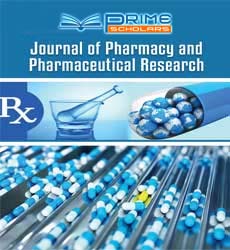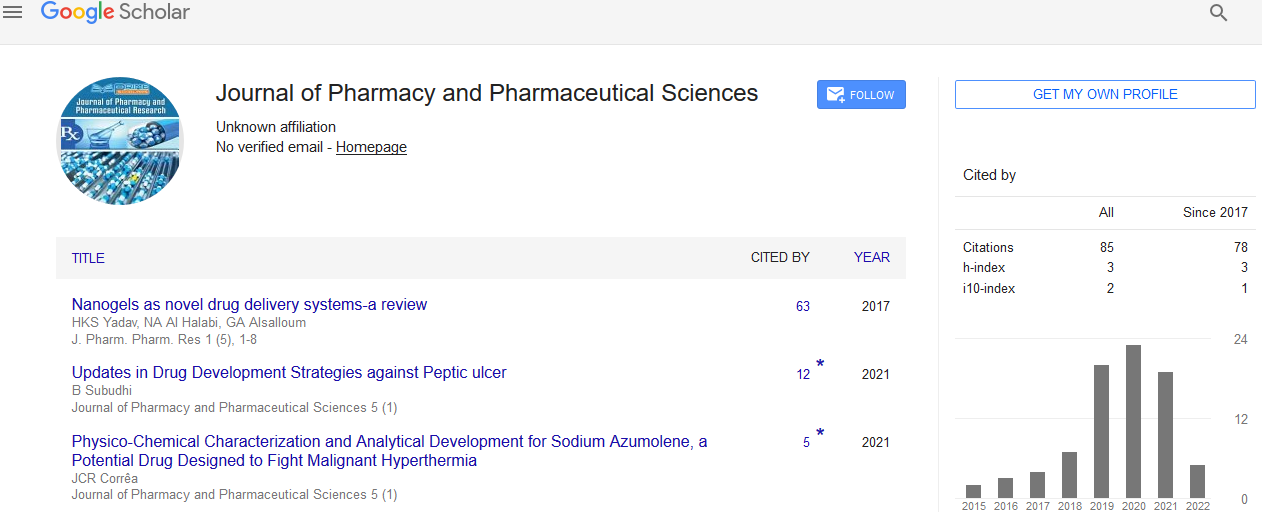Opinion - (2023) Volume 7, Issue 3
Safeguarding Kidney Health: The Role of Drug Therapy in Preventing Renal Complications
Wyan Xo*
Department of Pharmaceutics, Tianjin Institute of Pharmaceutical Research, China
*Correspondence:
Wyan Xo,
Department of Pharmaceutics, Tianjin Institute of Pharmaceutical Research,
China,
Email:
Received: 29-Aug-2023, Manuscript No. IPIPR-23-18165 ;
Editor assigned: 31-Aug-2023, Pre QC No. IPIPR-23-18165 (PQ);
Reviewed: 14-Sep-2023, QC No. IPIPR-23-18165 ;
Revised: 19-Sep-2023, Manuscript No. IPIPR-23-18165 (R);
Published:
26-Sep-2023, DOI: 10.21767/ipipr.7.03.025
Introduction
The kidneys, 2 bean-shaped organs located on either side of the
spine, play a crucial role in filtering waste and excess fluids from
the blood. They also help maintain the body’s electrolyte balance
and regulate blood pressure. However, various medical conditions
and factors can put the kidneys at risk, potentially leading to renal
complications. Drug therapy is a powerful tool in preventing and
managing these issues, and in this article, we will explore the importance
of drug therapy in protecting kidney health.
Before delving into drug therapy, it’s essential to understand the
renal complications that can occur and the conditions that increase
the risk of kidney damage: Uncontrolled high blood pressure
can damage the small blood vessels in the kidneys, impairing
their function. Diabetes is a leading cause of kidney disease. High
blood sugar levels can harm the tiny blood vessels in the kidneys,
leading to kidney damage over time.
Description
Various factors, including infections, autoimmune diseases, and
hereditary conditions, can cause Chronic Kidney Disease. It is characterized
by gradual loss of kidney function and is often managed
with drug therapy. Medications are prescribed to prevent the formation
of kidney stones, as these painful obstructions can lead to
kidney damage if left untreated. Certain infections, such as urinary
tract infections, can lead to kidney infections (pyelonephritis) and
potential kidney damage if not promptly treated with antibiotics.
High blood pressure is a significant risk factor for kidney damage.
Antihypertensive medications, including ACE inhibitors, ARBs, and
diuretics, help control blood pressure, preventing further kidney
damage. Medications such as insulin and oral hypoglycemic drugs
are used to manage blood sugar levels in diabetes, reducing the
risk of diabetic nephropathy, a condition that affects the kidneys.
In autoimmune diseases like lupus or glomerulonephritis, immunosuppressant
drugs help manage the immune system’s response
to prevent further kidney damage. Kidney stones can be excruciating,
and pain relief is a crucial part of their management. Non-steroidal
anti-inflammatory drugs or opioid medications may be prescribed.
Antibiotics are essential in treating kidney infections and
preventing them from causing lasting kidney damage.
Statin medications are used to lower cholesterol levels, reducing
the risk of atherosclerosis and maintaining good blood flow to the
kidneys. Aldosterone Antagonist help reduce proteinuria (excessive
protein in the urine) in conditions like CKD, which is an early
sign of kidney damage. Calcium Channel Blockers can help lower
blood pressure and reduce proteinuria in kidney disease. For individuals
prone to kidney stone formation, medications may be prescribed
to prevent the crystallization of stone-forming substances
in the urine. Patients must adhere to prescribed medication regimens,
which can be challenging for some due to side effects or
cost considerations. Response to medications can vary from person
to person, necessitating personalized treatment plans. Some
medications may have side effects or interact with other drugs,
making careful monitoring and adjustment essential.
Conclusion
The kidneys are vital organs with a significant impact on overall
health, and drug therapy plays a pivotal role in preserving kidney
function and preventing renal complications. Whether by controlling
blood pressure, managing diabetes, treating infections, or
preventing kidney stone formation, medications are indispensable
tools in the effort to safeguard kidney health. To achieve the best
results, healthcare providers and patients must work together to
develop personalized treatment plans that consider individual
needs and factors, promoting optimal kidney function and longterm
well-being. Lifestyle modifications, including a healthy diet
and exercise, are often necessary alongside drug therapy to optimize
kidney health.
Citation: Xo W (2023) Safeguarding Kidney Health: The Role of Drug Therapy in Preventing Renal Complications. J Pharm Pharm Res. 7:025.
Copyright: © 2023 Xo W. This is an open-access article distributed under the terms of the Creative Commons Attribution License, which permits unrestricted use, distribution, and reproduction in any medium, provided the original author and source are credited.

